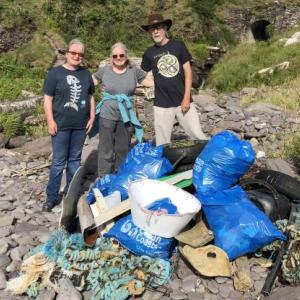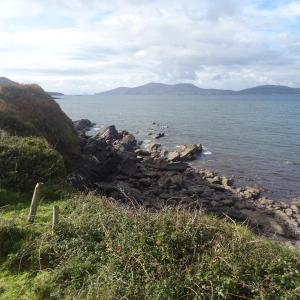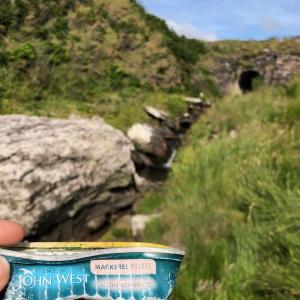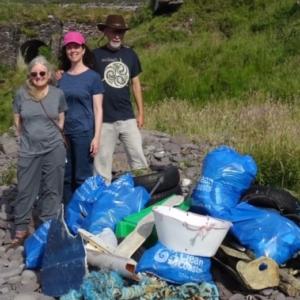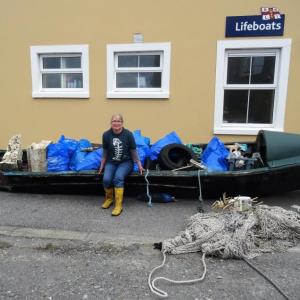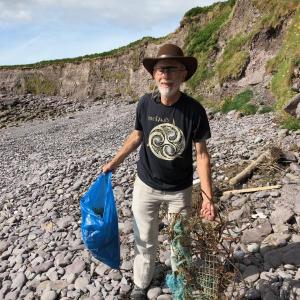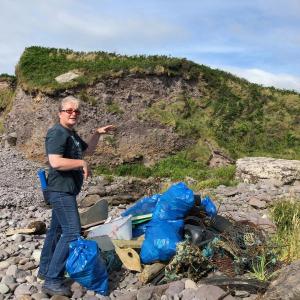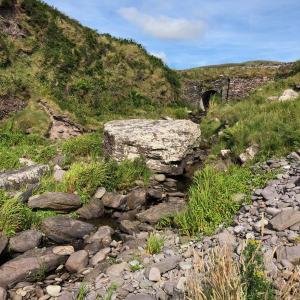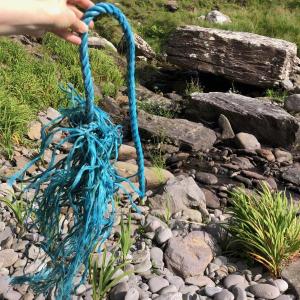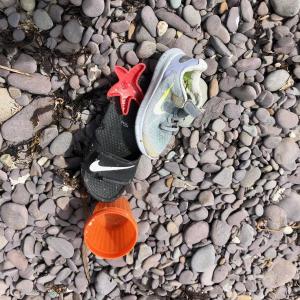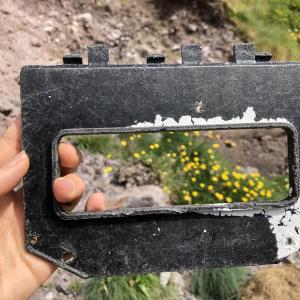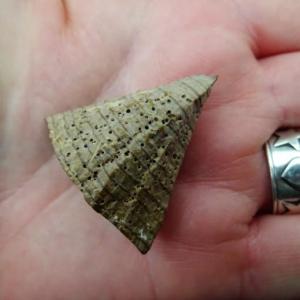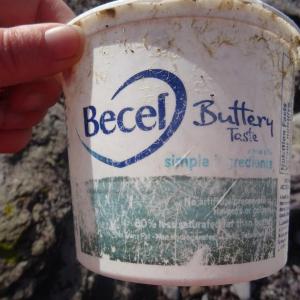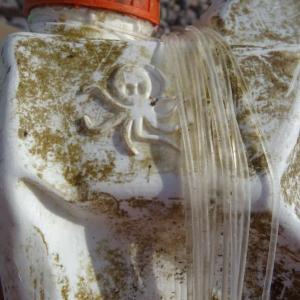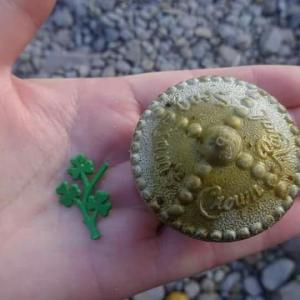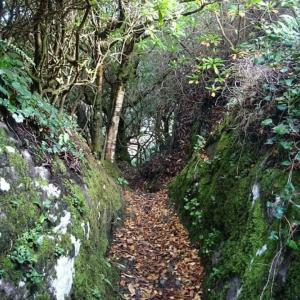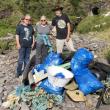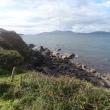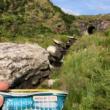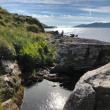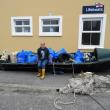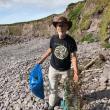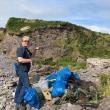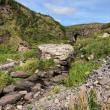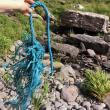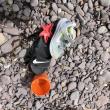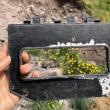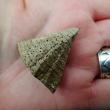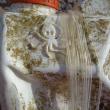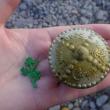‘I had no idea there was so much trash carried across the Atlantic’
Camden family helps clean Maine trash off Ireland beach
Wed, 10/30/2019 - 1:30pm
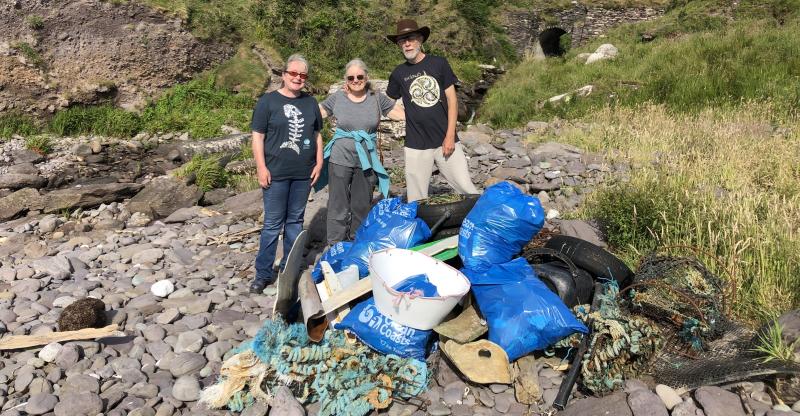 Rosemary Hill, with Laura and Eric Evans, of Camden. (Photo courtesy Heather Evans)
Rosemary Hill, with Laura and Eric Evans, of Camden. (Photo courtesy Heather Evans)
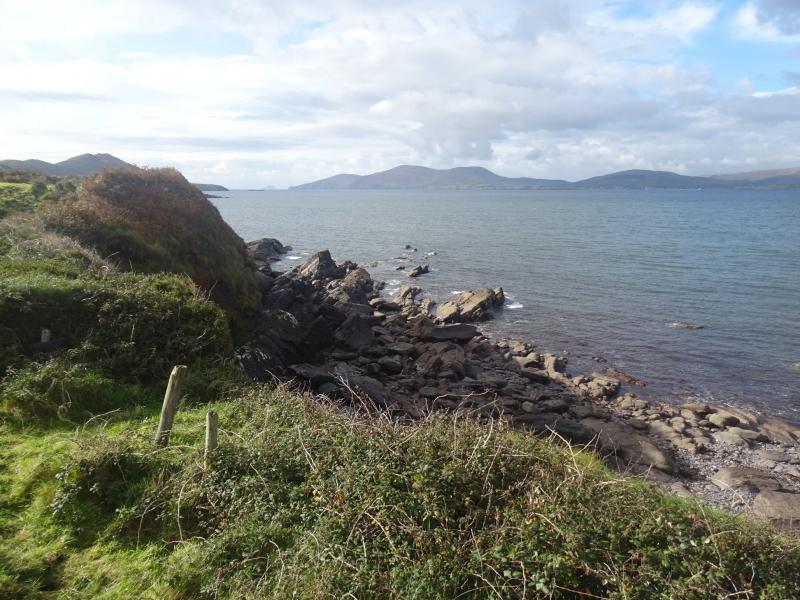 (Photo courtesy Rosemary Hill)
(Photo courtesy Rosemary Hill)
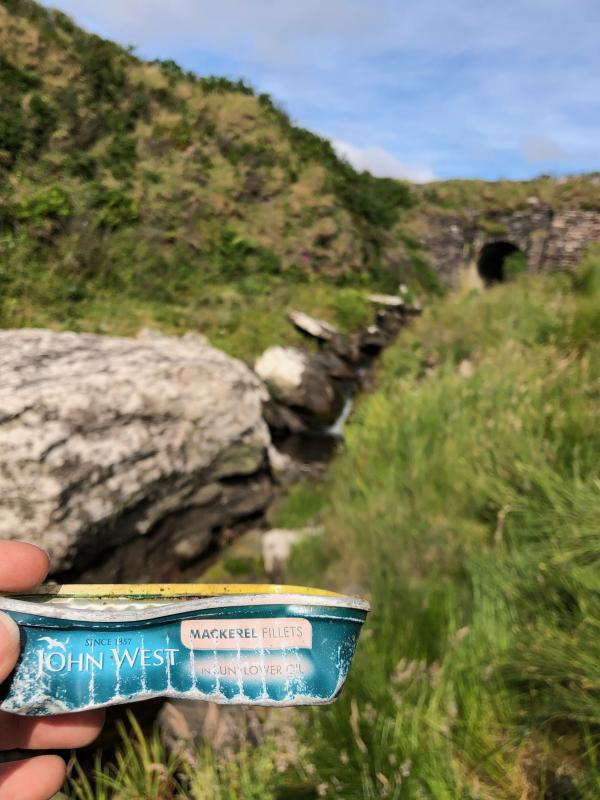 (Photo courtesy Heather Evans)
(Photo courtesy Heather Evans)
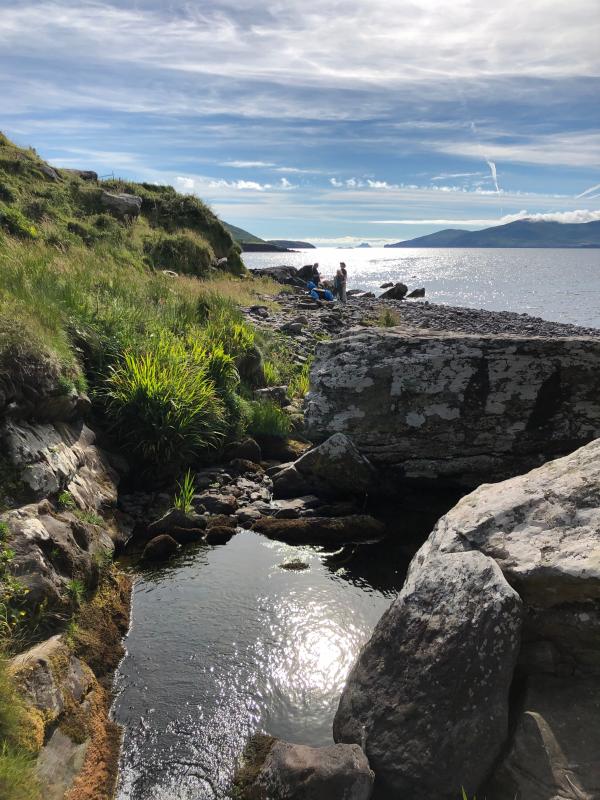 (Photo courtesy Heather Evans)
(Photo courtesy Heather Evans)
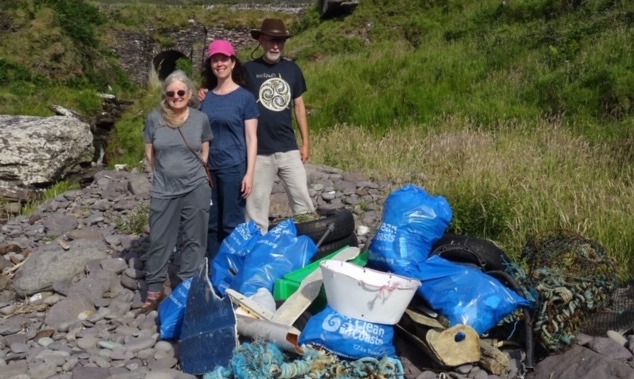 Laura Evans, Heather Evans and Eric Evans, with the pile of trash they collected with Rosemary Hill in Count Kerry, Ireland.(Photo courtesy Heather Evans)
Laura Evans, Heather Evans and Eric Evans, with the pile of trash they collected with Rosemary Hill in Count Kerry, Ireland.(Photo courtesy Heather Evans)
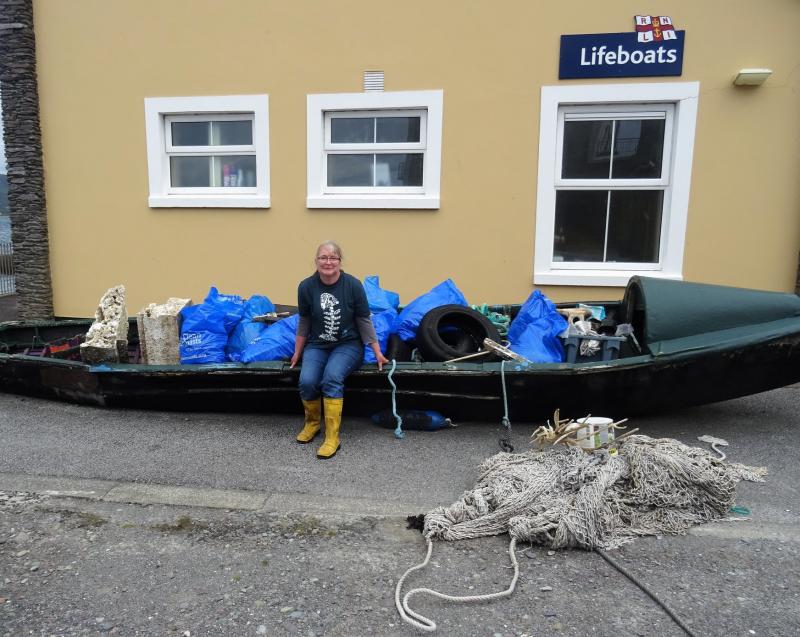 Cleaning up Beginish Island, with Rosemary Hill. (Photo courtesy Rosemary Hill)
Cleaning up Beginish Island, with Rosemary Hill. (Photo courtesy Rosemary Hill)
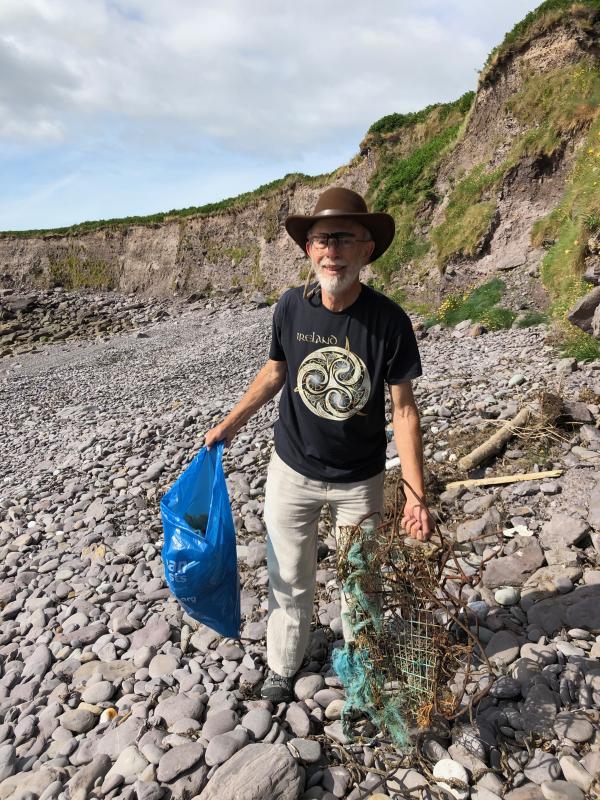 Eric Evans (Photo courtesy Heather Evans)
Eric Evans (Photo courtesy Heather Evans)
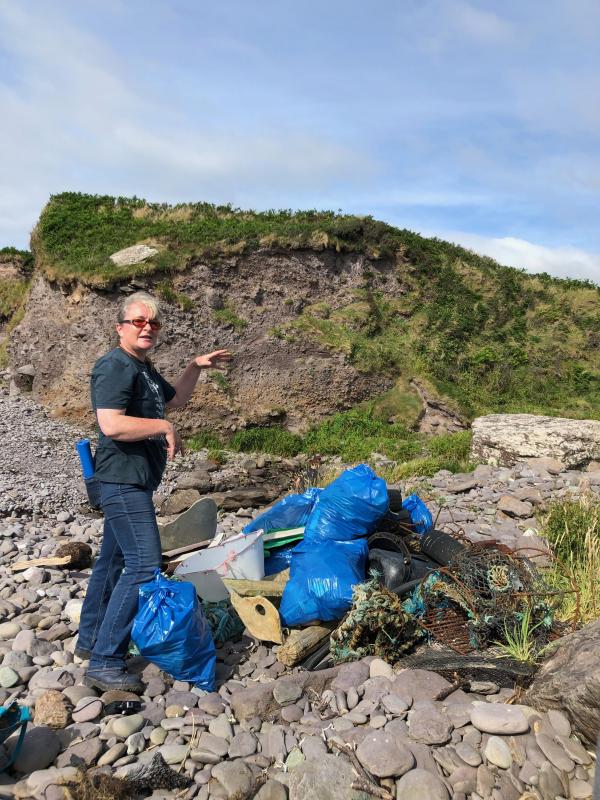 Rosemary Hill (Photo courtesy Heather Evans)
Rosemary Hill (Photo courtesy Heather Evans)
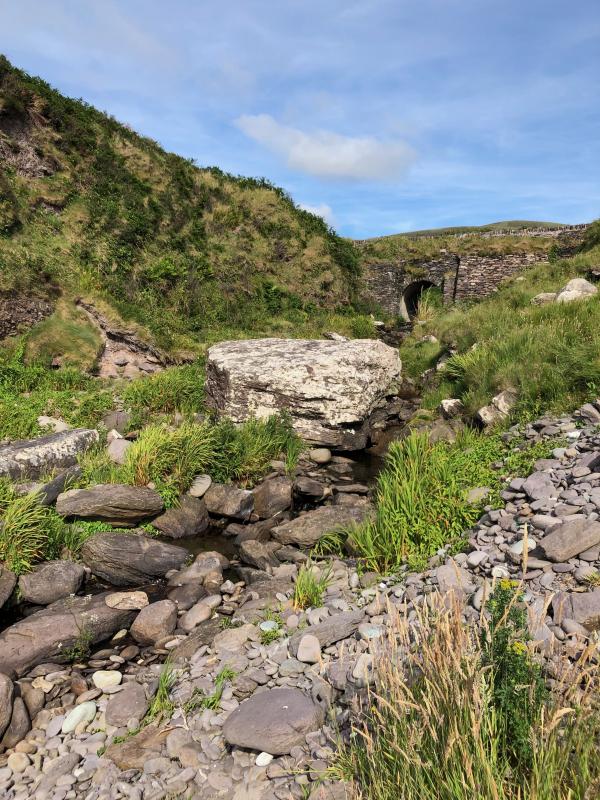 (Photo courtesy Heather Evans)
(Photo courtesy Heather Evans)
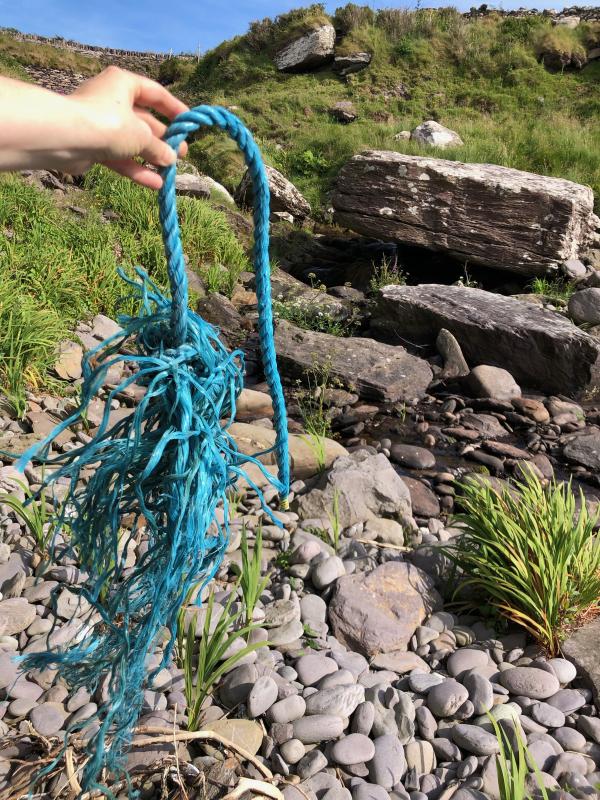 (Photo courtesy Heather Evans)
(Photo courtesy Heather Evans)
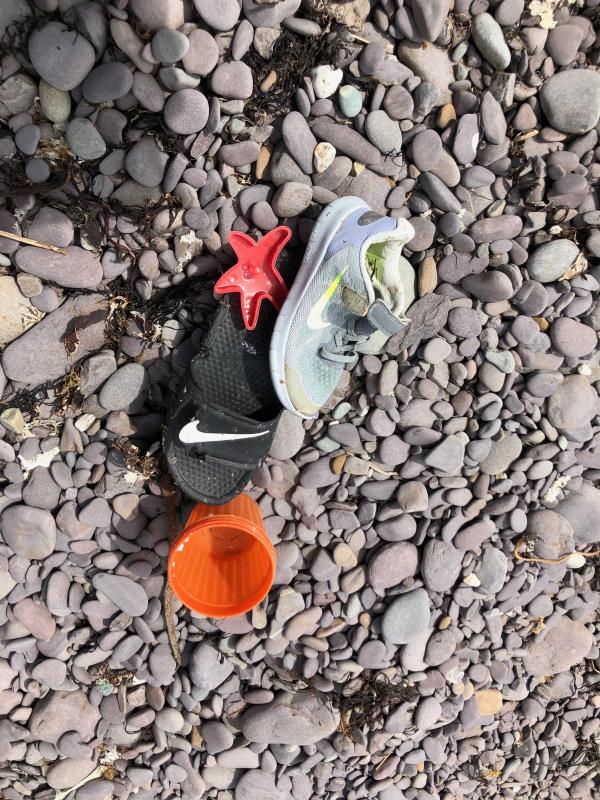 Shoes and other rubbish on a County Kerry beach. (Photo courtesy Heather Evans)
Shoes and other rubbish on a County Kerry beach. (Photo courtesy Heather Evans)
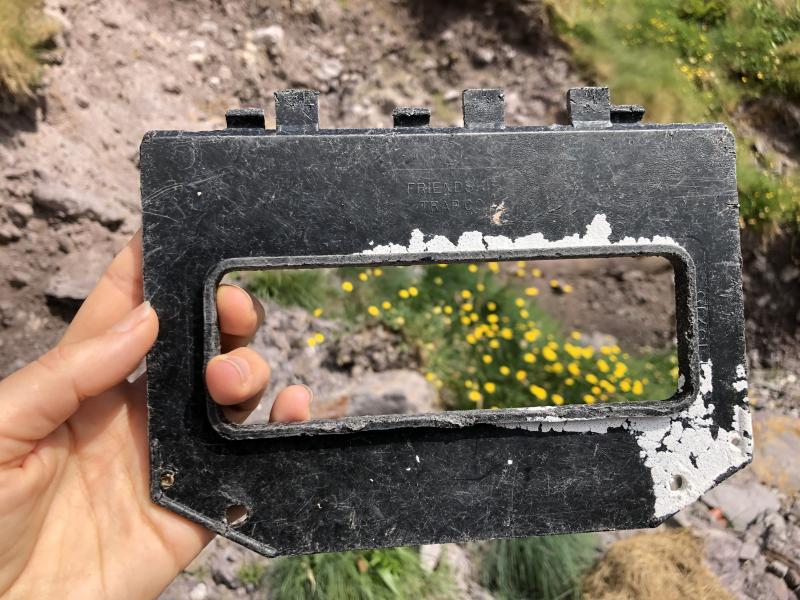 A piece of a Friendship Trap Company trap. (Photo courtesy Heather Evans)
A piece of a Friendship Trap Company trap. (Photo courtesy Heather Evans)
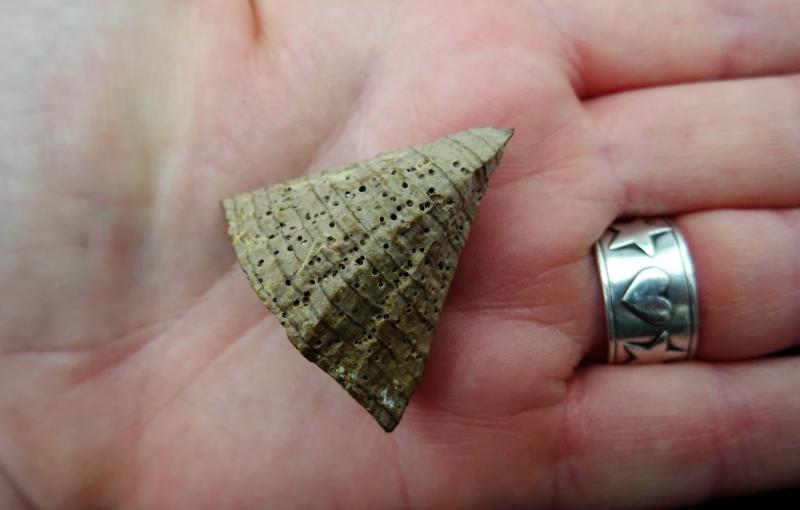 Rosemary Hill, on her Beachcombing in Kerry Facebook page, picks up a, “a prickle from a kapok tree, washed up on Boolakeel Beach.” (Photo courtesy Rosemary Hill)
Rosemary Hill, on her Beachcombing in Kerry Facebook page, picks up a, “a prickle from a kapok tree, washed up on Boolakeel Beach.” (Photo courtesy Rosemary Hill)
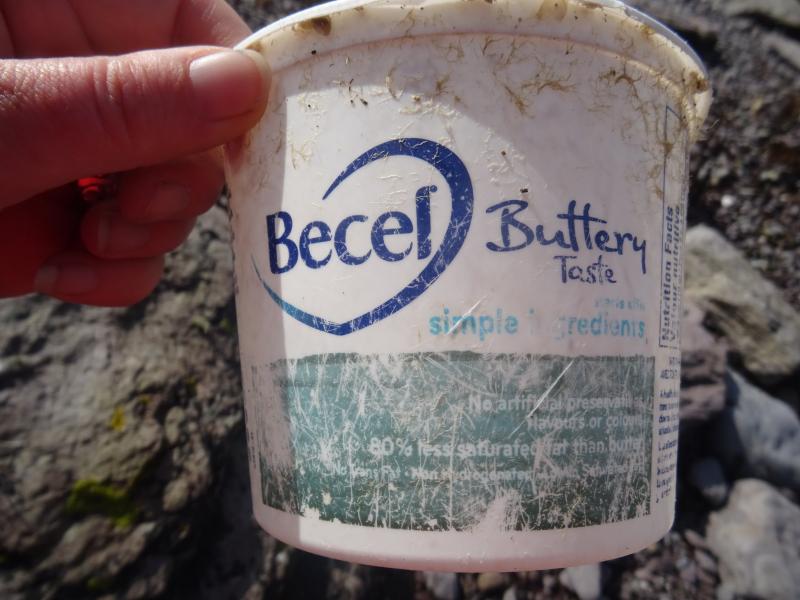 Plastic tub from Canada. (Photo courtesy Rosemary Hill)
Plastic tub from Canada. (Photo courtesy Rosemary Hill)
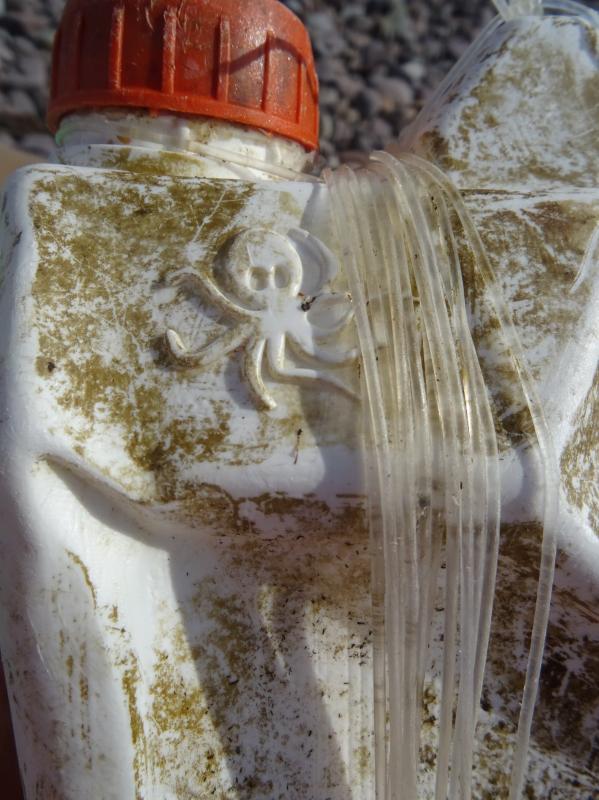 A bleach jug has Hill mystified as to its origin. (Photo courtesy Rosemary Hill)
A bleach jug has Hill mystified as to its origin. (Photo courtesy Rosemary Hill)
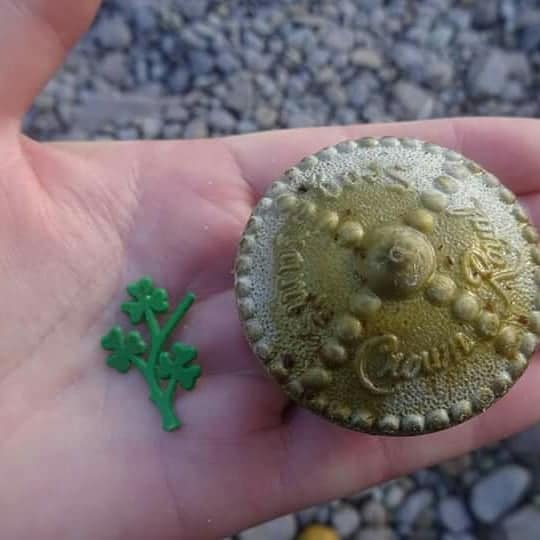 Intriguing pieces of plastic (Photo courtesy Rosemary Hill)
Intriguing pieces of plastic (Photo courtesy Rosemary Hill)
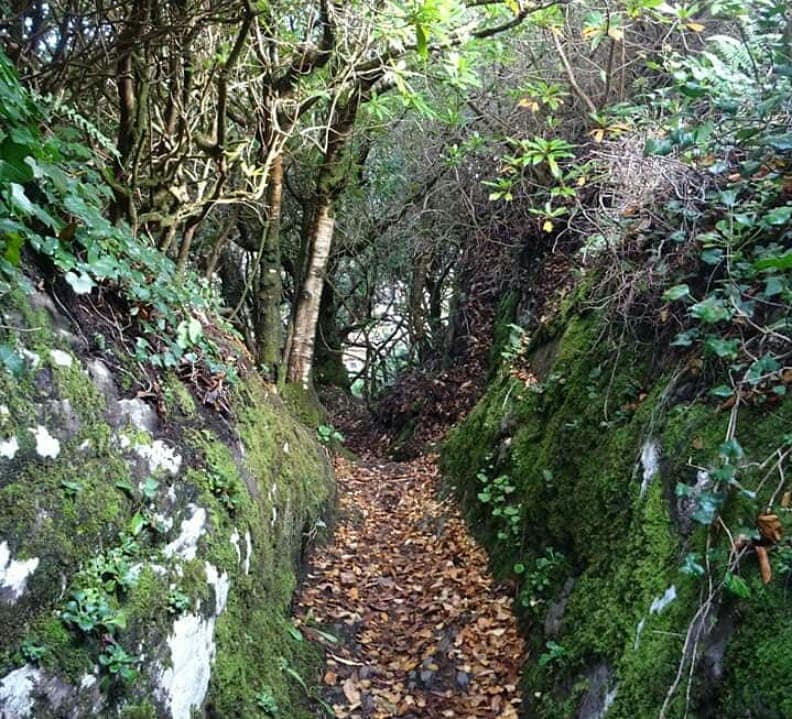 The beauty of Ireland. (Photo courtesy Rosemary Hill)
The beauty of Ireland. (Photo courtesy Rosemary Hill)
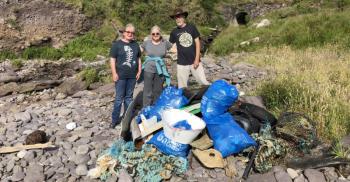 Rosemary Hill, with Laura and Eric Evans, of Camden. (Photo courtesy Heather Evans)
Rosemary Hill, with Laura and Eric Evans, of Camden. (Photo courtesy Heather Evans)
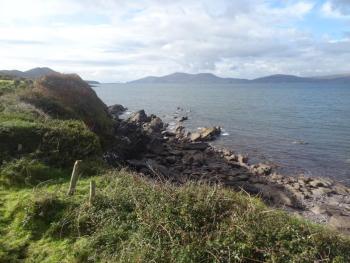 (Photo courtesy Rosemary Hill)
(Photo courtesy Rosemary Hill)
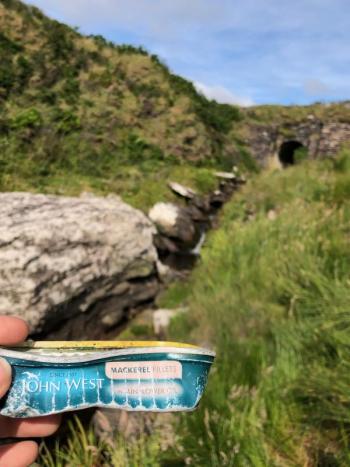 (Photo courtesy Heather Evans)
(Photo courtesy Heather Evans)
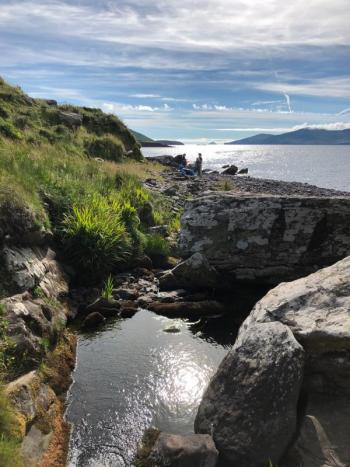 (Photo courtesy Heather Evans)
(Photo courtesy Heather Evans)
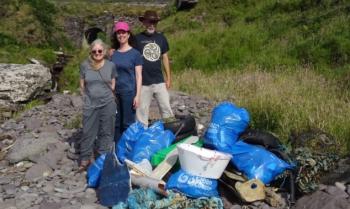 Laura Evans, Heather Evans and Eric Evans, with the pile of trash they collected with Rosemary Hill in Count Kerry, Ireland.(Photo courtesy Heather Evans)
Laura Evans, Heather Evans and Eric Evans, with the pile of trash they collected with Rosemary Hill in Count Kerry, Ireland.(Photo courtesy Heather Evans)
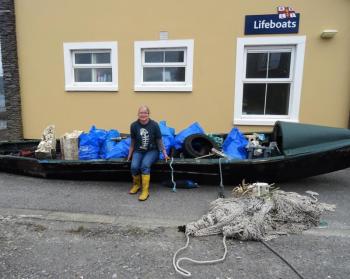 Cleaning up Beginish Island, with Rosemary Hill. (Photo courtesy Rosemary Hill)
Cleaning up Beginish Island, with Rosemary Hill. (Photo courtesy Rosemary Hill)
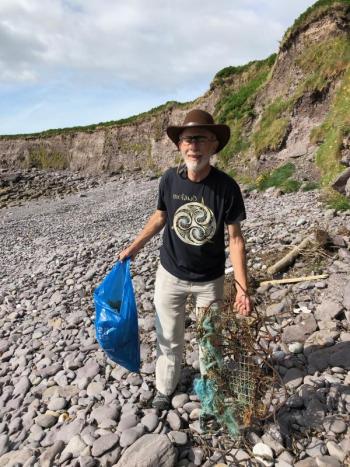 Eric Evans (Photo courtesy Heather Evans)
Eric Evans (Photo courtesy Heather Evans)
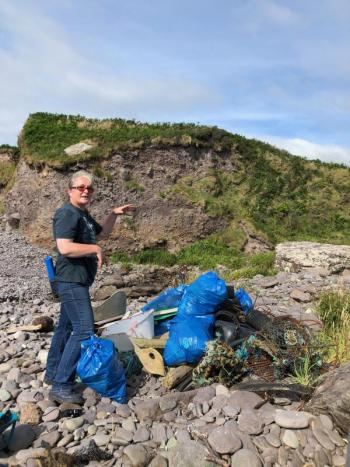 Rosemary Hill (Photo courtesy Heather Evans)
Rosemary Hill (Photo courtesy Heather Evans)
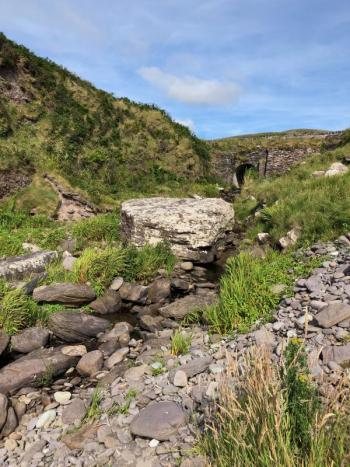 (Photo courtesy Heather Evans)
(Photo courtesy Heather Evans)
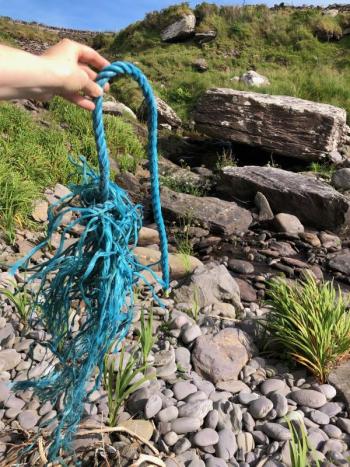 (Photo courtesy Heather Evans)
(Photo courtesy Heather Evans)
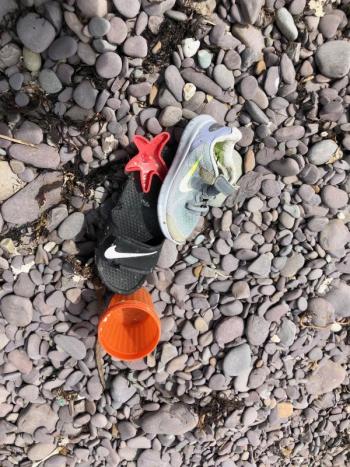 Shoes and other rubbish on a County Kerry beach. (Photo courtesy Heather Evans)
Shoes and other rubbish on a County Kerry beach. (Photo courtesy Heather Evans)
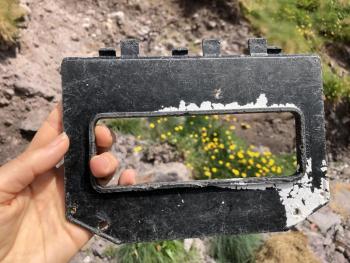 A piece of a Friendship Trap Company trap. (Photo courtesy Heather Evans)
A piece of a Friendship Trap Company trap. (Photo courtesy Heather Evans)
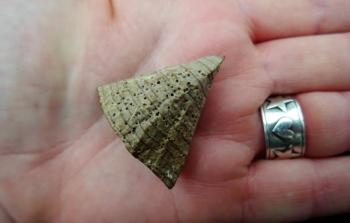 Rosemary Hill, on her Beachcombing in Kerry Facebook page, picks up a, “a prickle from a kapok tree, washed up on Boolakeel Beach.” (Photo courtesy Rosemary Hill)
Rosemary Hill, on her Beachcombing in Kerry Facebook page, picks up a, “a prickle from a kapok tree, washed up on Boolakeel Beach.” (Photo courtesy Rosemary Hill)
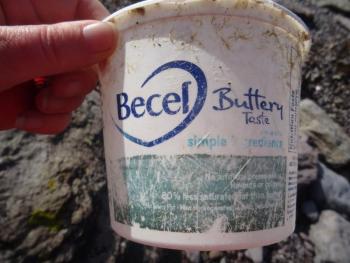 Plastic tub from Canada. (Photo courtesy Rosemary Hill)
Plastic tub from Canada. (Photo courtesy Rosemary Hill)
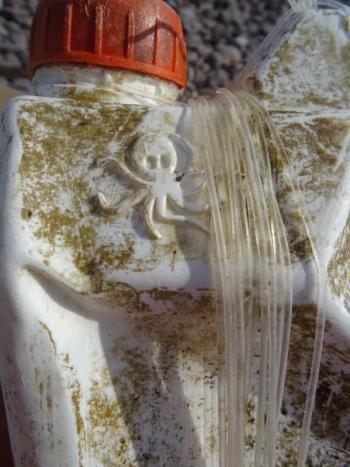 A bleach jug has Hill mystified as to its origin. (Photo courtesy Rosemary Hill)
A bleach jug has Hill mystified as to its origin. (Photo courtesy Rosemary Hill)
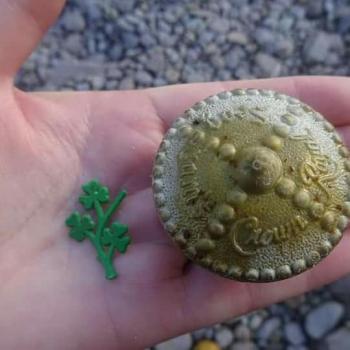 Intriguing pieces of plastic (Photo courtesy Rosemary Hill)
Intriguing pieces of plastic (Photo courtesy Rosemary Hill)
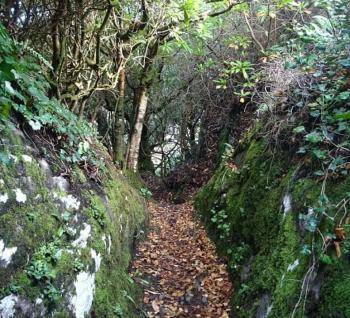 The beauty of Ireland. (Photo courtesy Rosemary Hill)
The beauty of Ireland. (Photo courtesy Rosemary Hill)
COUNTY KERRY, IRELAND — Rosemary Hill lives in Waterville, Ireland, and has become a friend to many in Midcoast Maine. Not that she’s ever been here; that last time she was in the U.S., it was for a New York City adventure. But she is familiar to those on this side of the Atlantic through her Facebook page, Beachcombing in Kerry, where she reports on the latest treasures and trash she has cleaned from her country’s beaches.
She has been talking with residents of Maine’s fishing communities since she launched the popular page in 2013, posting photos of curious finds, or lobster trap tags, wondering whether their owners are in Maine or Canada.
On this side of the ocean, her Facebook friends pore over the photos, surmising the tag might belong to a certain fisherman down the road, but just not quite sure, and then tag other friends to see if they know.
They are intrigued at how a little piece of lobster trap from Maine could ride the currents over a cold ocean, land on a rocky Ireland shore, and then show up on the Internet, the subject of an international chat.
“I love that I have been traipsing back and forth across the same stones for so many years, looking for treasures, and making connections with people, in amongst the trash,” said Hill, in late October. “Because we are on the Atlantic coast it's relatively common to find things that have come across from the other side of the world and these are the things that I enjoy trying to identify or trace backwards.”
There is also the mystery trash, like an empty bleach container that has no recognizable markers.
“I'm thinking this bottle has travelled a long way?” she poses to the world, adding a photograph of the white rubbish. “It looks like it was used as a fishing float as it had nylon tied around the neck and then wound around the bottle. I love the octopus on it!”
While she is a beachcomber at heart, Hill abhors the trash. She has spent years cleaning a 20-mile stretch of Ireland’s beaches, organizing collection days, encouraging her community to help her, and enlisting local government to pick up the large items that wash ashore, and the huge blue garbage bags they have filled with trash and create piles alongside the roads.
While much of it originates up and down the U.S. East Coast and Canada, a portion derives from Maine’s Midcoast, thanks to the North Atlantic currents that swell and lift it to the Arctic and to the rocky and remote shores of County Kerry, also home to fishing communities.
As Hill persists in calling attention to the ocean trash, more have become aware of the problem. In July, a Camden, Maine, family went to visit County Kerry, specifically to help her clean a beach.
Heather Evans and her parents, Laura and Eric Evans, whose ancestors are from County Kerry, contacted Hill, and soon were trekking over a fence, down a cow path by a stone bridge, over a stream and onto a hidden beach. In one afternoon, they filled six large garbage bags of trash, including shoes and flip-flops that apparently tumbled off a cargo ship.
“We were finding trash from Maine,” said Heather Evans, including pieces of traps that were locally made.
In 2014, PenBayPilot.com talked with Hill, learning how she had discovered tags and other pieces of fishing gear that originated from Gulf of Maine harbors. She had forged connections with Maine residents, and the number of likes on her Facebook page climbed with those helping to identify lobster gear and buoys that wash up on her country’s beaches.
“In 2014 or so, a friend of mine shared your article on her [Facebook] timeline,” said Evans. “I had no idea there was so much trash carried across the Atlantic. I started following Rosemary’s page, Beachcombing in Kerry, and thought that I’d like to meet her and help pick up trash from Maine. This past summer, my folks and I finally went on a family history trip to Ireland and Wales.”
“Rosemary said we were the first to come from the U.S. to help her,” said Evans. “ It was truly a highlight of our trip.”
Evans, who grew up in Appleton and now lives in Camden, was also inspired by a film she watched at the Banff Film Festival, when it came to Camden. That film, North of the Sun, is about two surfers who spent nine months in the dark, in the Arctic, surfing, surviving and likewise encountering the trash of the world.
To Hill, the discouraging routine of cleaning beaches is offset by the rugged beauty of her home, the rocky stretches punctuated by sandy beaches.
And she loves the peace and quiet, especially through the winter months, when she does most of her beach-cleaning).
“I love St. Finan's Bay and the views are amazing but how can someone walk through all the rubbish and not even pick one piece up?” she posts. “This woman plonked herself right in the middle of where I was picking up pieces of rope, bottle caps, etc., and then announced that she was meditating. It does my head in.”
But she continues to pick up the garbage, in part because she admits she has a stubborn streak, and because she does not want to abandon the beaches. They are part of her, now, and she is part of them.
“On most of the beaches that I frequent, you can see a difference after my beachcleaning efforts (the exceptions are the few locally that are full of microplastics) but I'm so aware that it'll just take one bad storm to get everything back to square one again,” she said, late in October. “I try not to let it grind me down, I feel like I have to TRY and make a difference but at times it really does feel overwhelming. I can't turn my back on it; it does feel like trying to literally hold back the tide sometimes but it's my stubborn streak and I just have to keep going.”
Hill hopes that humans will decrease the amount of rubbish in the oceans and waterways.
“People seem so be a lot more clued in on this subject, but then you still see people dropping litter in the street without thinking about where it might end up,” she said. “I don't know if I'll see an improvement on 'my' beaches in my own lifetime but hopefully things will change. I'm definitely finding it easier to get people involved in beach cleans but we need to try and reduce our reliance on plastic in our daily lives.”
Reach Editorial Director Lynda Clancy at lyndaclancy@penbaypilot; 207-706-6657
Event Date
Address
waterville
ireland
Ireland
Standard Post

